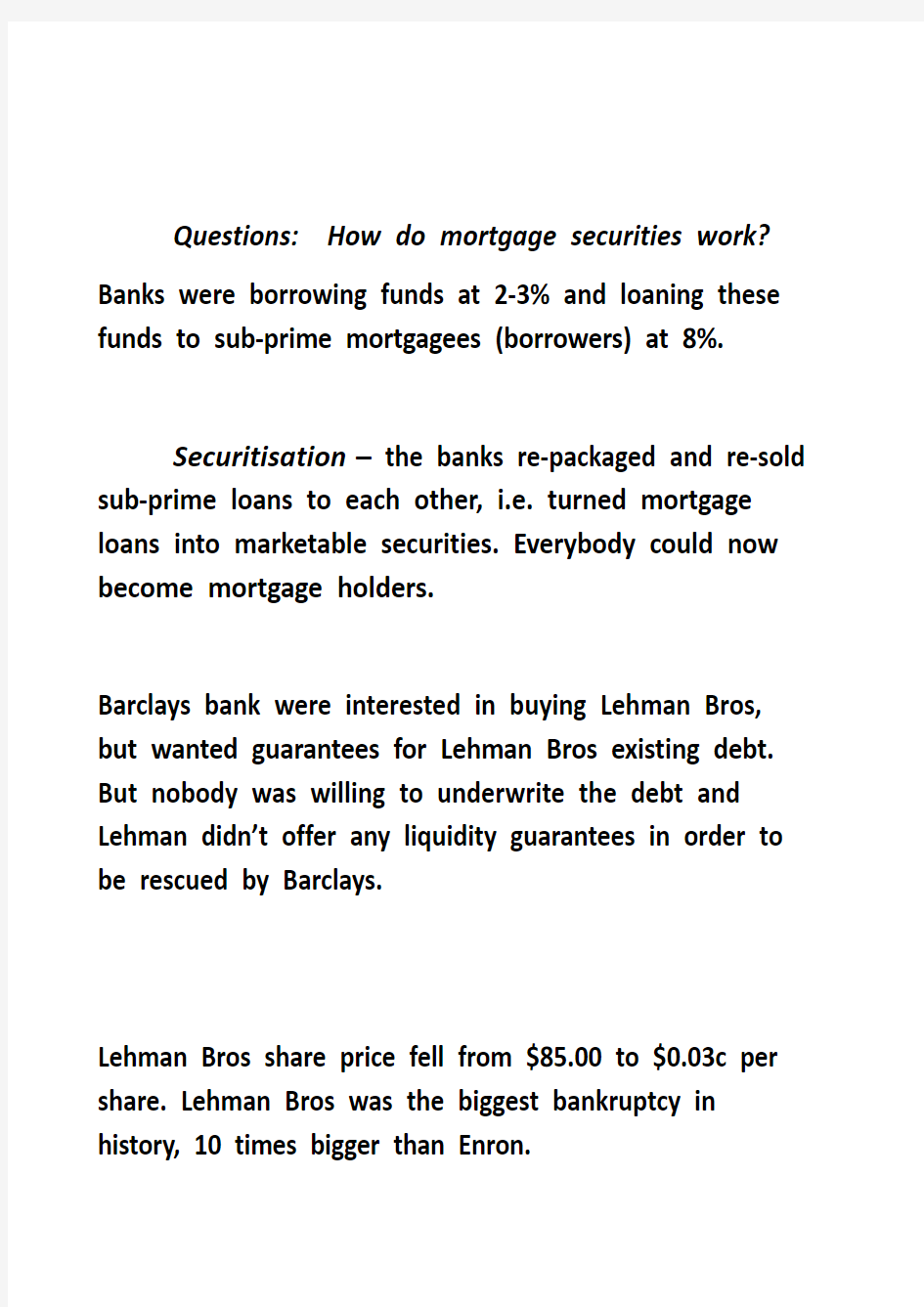ACCT6002_International Accounting_2010 Semester Winter_Lecture role of Accounting in financial crisi


International Accounting
The role of accounting in the global financial crisis
I.What can we learn from the global financial crisis? Lehman Brothers
Lehman Brothers were the largest underwriters of home mortgages. Lehman Bros borrowed $44 for each $1 it owned – highly leveraged, too aggressive a policy for a firm. Lehman Bros played property market with it’s borrowings – invested heavily into commercial property.
Dick Fold – Lehman Bros CEO had encouraged and pushed staff to chase high risk investments which offered high returns. This was the culture which Dick Fold had encouraged. As a result staff received millions in bonuses.
Questions: How do mortgage securities work?
Banks were borrowing funds at 2-3% and loaning these funds to sub-prime mortgagees (borrowers) at 8%.
Securitisation– the banks re-packaged and re-sold sub-prime loans to each other, i.e. turned mortgage loans into marketable securities. Everybody could now become mortgage holders.
Barclays bank were interested in buying Lehman Bros, but wanted guarantees for Lehman Bros existing debt. But nobody was willing to underwrite the debt and Lehman didn’t offer any liquidity guarantees in order to be rescued by Barclays.
Lehman Bros share price fell from $85.00 to $0.03c per share. Lehman Bros was the biggest bankruptcy in history, 10 times bigger than Enron.
The housing market damaged the financial system, which in turn damaged the economy. The Dow Jones decreased by 500 points. Confidence was destroyed. The banks would not even lend to each other.
The collapse of Lehman Bros brought the global financial system to its knees.
Greed took over. It was the boom before the bust. The fall of Lehman Bros was the tipping point into the financial recession. The trigger was securitised sub- prime mortgages. But if not for that, something else would have triggered it.
What lessons we have?
Financial markets do not work perfectly, but some people believe it’s still the best system we have?
The financial crisis could happen again, because nobody can change “human nature”?
What government should to? Should the government have bailed Lehman Bros out?
II.The role of accounting: Fair value accounting
What is fair value accounting?
Is fair value accounting(mark-to-market accounting) responsible for failure of US banks?
Some asserted that fair value accounting requires potentially inappropriate write-downs in the value of investments held by financial institutions, and such write-downs were the result of inactive, illiquid, or irrational markets that resulted in values that did
not reflect the underlying economics of the securities. They believe there is correlation between U.S.
GAAP fair value reporting and the regulatory capital requirements of financial institutions, and
this correlation could lead to the failure of long-standing financial institutions if sufficient additional capital is unavailable to offset investment write-downs.
Further, they believed the need to raise additional capital, the effect of failures, and the reporting of large write-downs would have broader negative impact on markets and prices, leading to further write-downs and financial instability, so as to exacerbated financial crisis severity.
Other market participants stated that fair value accounting serves to enhance the transparency of financial information provided to investors and the public.
Poor lending decisions and inadequate risk management, combined with shortcomings in the current approach to supervision and regulation, rather than accounting, are the root causes of the crisis.
Fair value information is vital in times of stress, and a suspension of this information would weaken investor confidence and result in further instability in the markets. It would also be hiding from capital providers the true economic condition of a financial institution.
SEC report, January 2009, OFFICE OF THE CHIEF ACCOUNTANT,
US SECURITIES AND EXCHANGE COMMISSION
“Report and Recommendations Pursuant to Section 133 of the Emergency Economic Stabilization Act of 2008: Study on Mark-To-Market Accounting”
From the sample of financial institutions studied in this section of the study, the Staff observed that fair value measurements were used to measure a minority of the assets (45%) and liabilities (15%) included in financ ial institutions’ balance sheets. The percentage of assets for which changes in fair value affected income was significantly less (25%), reflecting the mark-to-market requirements for trading and derivative investments. However, for those same financial institutions, the Staff observed that fair value measurements did significantly affect financial institutions’ reported income.
The Staff observes that fair value accounting did not appear to play a meaningful role in bank failures occurring during 2008. Rather, bank failures in the U.S. appeared to be the result of growing probable credit losses, concerns about asset quality, and, in certain cases, eroding lender and investor confidence. For the failed banks that did recognize sizable fair value losses, it does not appear that the reporting of these losses was the reason the bank failed.
Research Paper: “Did Fair-Value Accounting Contribute to the Financial Crisis?” Christian Laux, and Christian Leuz, Journal of Economic Perspectives 2010
The paper examines the role of fair-value accounting in the financial crisis using descriptive data and empirical evidence. Based on their analysis, it is unlikely that fair-value accounting added to the severity of the 2008 financial crisis in a major way.
While there may have been downward spirals or asset-fire sales in certain markets, they find little evidence that these effects are the result of fair-value accounting.
The study also finds little support for claims that fair-value accounting leads to excessive writedowns of banks’ assets.
Instead, the empirical evidence suggests overvaluation of bank assets in the financial crisis.
Research Paper: “Information Asymmetry of Fair Value Accounting and Loan Loss Provisions during the Global Financial Crisis”, By Lin, Kang, Morris, and Tang 2010, working paper at SSRN e-Journal.
This paper investigates the information roles of the three-level fair value hierarchy in SFAS 157 Fair Value Measurement for US banks during the 2008 Global Financial Crisis. Using bid-ask spread to proxy for information asymmetry, we find positive and significant relations between information asymmetry and fair value estimates for all three levels of fair value measurements: Level 1 (unadjusted observable inputs in active markets), Level 2 (other indirect observable inputs), and Level 3 (unobservable inputs estimated by management assumptions and models).
Additional analyses show that those positive coefficients are more significant for banks with larger total assets and higher risk adjusted capital ratio Tier 1. Across the four quarters of 2008, as market conditions worsen, fair value measurements are constantly and strongly associated with information risks and uncertainty during the 2008 Global Financial Crisis.
